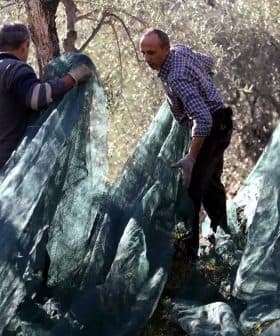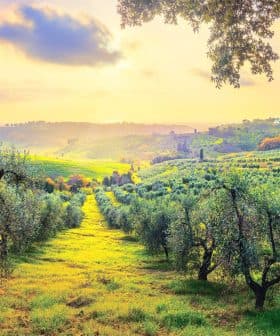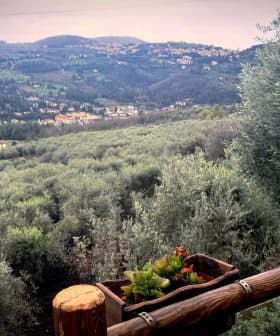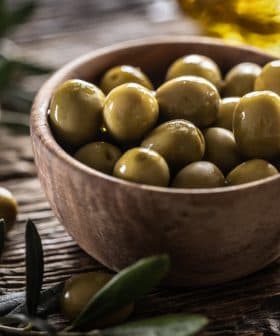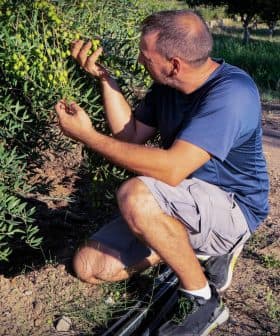New Law in Sicily Protects and Promotes the Mediterranean Diet
The purpose of the new law is to promote local food production, MedDiet education, wine and oleotourism, public health and environmental protection strategies.
 6.0K reads
6.0K readsA new regional law in Sicily formalizes the Mediterranean diet as a crucial part of the local identity, promoting local agriculture, food production, public health, and environmental protection. The law paves the way for public and private initiatives to educate consumers about the benefits of the Mediterranean diet and includes the creation of a MedDiet museum and oleotouristic routes to showcase local products. Sicilian olive oil expert Ettore Barbagallo highlights the social aspects of the Mediterranean diet and the unique connection between Sicily and the diet, emphasizing the importance of recognizing and promoting the diet’s cultural, economic, and environmental potential.
In a first for Italy, a new regional law in Sicily formalizes the role of the Mediterranean diet as a crucial part of the local identity.
The Mediterranean Diet Recognition and Protection Act paves the way for a plethora of public and private initiatives to boost consumers’ consciousness about the benefits of the Mediterranean diet.
More people are discovering the healthy aspects of the MedDiet. What often gets neglected is the enormous potential of the MedDiet in terms of culture and environment. I hope this new law will help many to focus on this.
The purpose of the new law approved by the semi-autonomous regional assembly is to promote local agriculture and food production at a national and international level, MedDiet education, wine and oleotourism, enhance public health and encourage environmental protection strategies.
Support will be given to public and private initiatives whose aim is to inform the public about the MedDiet and the culture behind it. Educational curricula for schools and universities about the diet are also included in the law.
See Also:New Rules in Italy Set Standards for Oleotourism OperatorsThe overarching goal of the law is to formally recognize the specific connection between Sicily and the Mediterranean diet, defined as “the protection of the historical-cultural heritage, expression of the Sicilian territory identity.”
A sustainable lifestyle, respect for the land and expression of the cohabitation of different cultures are also cited as part of the local approach to MedDiet principles.
“The unique feature of Sicilian food and cooking is that its tradition perfectly overlaps with the principles of the Mediterranean diet: the choice of the ingredients, the use of locally-produced food, the variety of the colors of the local diet, which is mostly plant-based, and the extreme popularity of olive oil in the households,” Ettore Barbagallo, a professional olive oil taster and author of the Mediterranean diet section of the Etna Volcano Museum in Sicily, told Olive Oil Times.
“The whole Sicilian approach to food including its social aspects, historically adhere to the Mediterranean diet,” he added.
The new law also funds the creation of a multi-functional MedDiet museum and the opening of oleoutouristic strades (Italian for routes), a series of initiatives connecting regions and extra virgin olive oil production. The idea is to facilitate the tourists’ discovery of high-quality local products and their diversity among the different regions.
Such strades already exist for the promotion of wine production. Since the new national law on oleotourism was enacted, olive oil-related touristic initiatives also are flourishing.
The new law also allows for the cooperation between these wine and olive oil networks with other local food production chains.
The new law also aims to reinforce public and private sector cooperation through the Mediterranean Diet Network Operators, which will encourage local governments to work with all kinds of different companies to promote the Mediterranean diet.
Furthermore, March 21 has been declared as the regional day for the Mediterranean diet as a universal heritage by the new law, in explicit reference to the diet’s inclusion on the list of World Intangible Heritage by UNESCO.
The law also refers to the social aspects of the Mediterranean diet, which are illustrated at the base of the MedDiet pyramid.
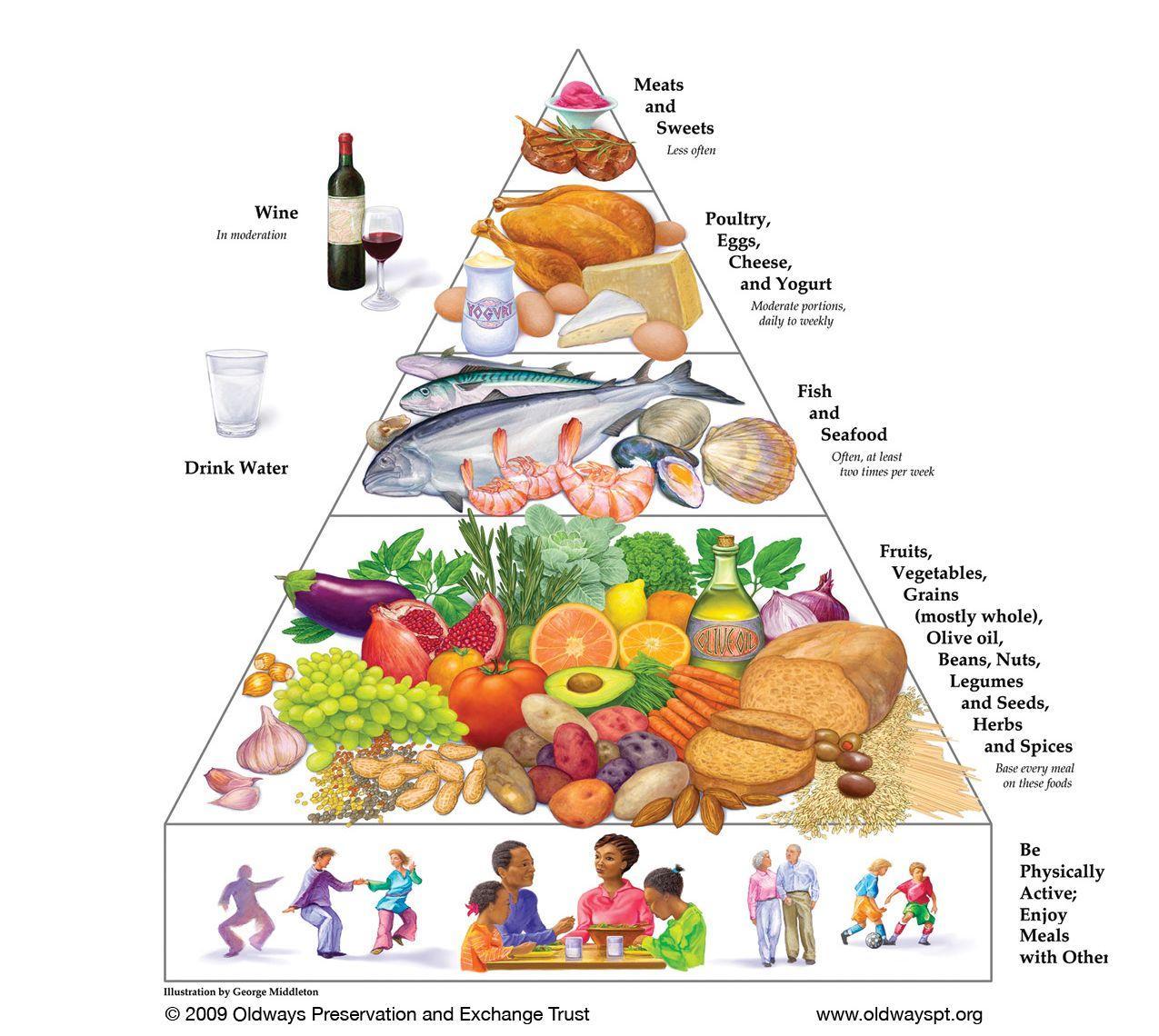
Photo: Oldways
“That is a very interesting part of the Mediterranean diet which is often ignored,” Barbagallo said. “The social role of the pyramid is exactly the social role of meals in Sicily and other southern regions of Italy, as eating together expresses a unique form of sociality that cannot be replicated in different moments of the day, and it’s part of a healthy lifestyle.”
The new law also encourages local institutions in Sicily to collaborate with other public and private entities across the Mediterranean basin to promote the culture of the Mediterranean diet and reincofrce its identity across the region.
The role of extra virgin olive oil is recognized as crucial by experts in protecting and nurturing the Mediterranean diet.
“Extra virgin olive oil has a unique profile,” Barbagallo said. “While olive oil is part of the tradition, more recently, Sicilians are beginning to explore the differences between the different qualities of extra virgin olive oil. It is a trend. We see even younger generations explore typical products, higher quality products, local products.”
According to Barbagallo, the reason that MedDiet-related products increasingly are appreciated is their recognition as part of the local identity.
“The connection with the territory is highly felt,” he said. “Take, for example, Sicilian extra virgin olive oil, now recognized by the European Union with a Protected Geographical Indication. It is a protocol which defines extra virgin olive oil only if locally produced, a true recognition of its connection with the land and its cultures.”
Barbagallo also hinted at the need for local businesses and farmers to fully understand and unleash the economic, social, healthy and environmental potential of the Mediterranean diet.
“Many still do not seem to get the role the Mediterranean diet can play in shaping our future,” he said. “More people are discovering the healthy aspects of the MedDiet. What often gets neglected is the enormous potential of the MedDiet in terms of culture and environment. I hope this new law will help many to focus on this.”
The vice-president of the regional assembly and first signatory of the law, Angela Foti, said “the approval of such a law represents a concrete step 10 years after the MedDiet was included in the list of UNESCO Intangible Heritage.”
“Historically, Sicily is the place where a number of different populations and civilizations have met,” Barbagallo concluded. “It is the exact center of the Mediterranean Sea where so many different genetic codes coexist, traditions coming from many different areas of the world which here have joined together, giving form to a way of being, to a lifestyle which has a very special connection to MedDiet.”
Share this article


